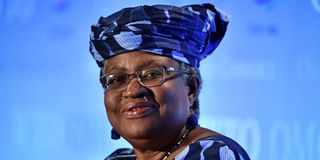The kidnapping that almost ended Ngozi Okonjo-Iweala's fight against corruption

Dr Ngozi Okonjo-Iweala, who served as Nigeria's Finance minister.
What you need to know:
- Ngozi shares her book, Reforming the Unreformable: Lessons from Nigeria, that being Finance minister or chancellor of the Exchequer is a risky and thankless job.
- Ngozi's objective was to exterminate corruption cartels that were robbing the nation.
The global average tenure for a Finance minister is two years. Ngozi Okonjo-Iweala made it to three in her first stint under President Olesegun Obasanjo's administration and completed four years in her second tenure under President Goodluck Jonathan. She lasted a record of seven transformational years of expansive monetary reforms and substantial innovations.
Harvard-educated Ngozi had initially served as a World Bank Development economist in Washington DC for 25 years. In 2000, she was made the economic adviser to President Obasanjo and elevated to the Foreign ministry during Obasanjo's second term.
When she resigned from the Finance ministry in 2006, she earned admiration and endearment from the people. In 2008, President Umaru Yar'Adua twice requested her return to the Finance ministry to fix the incompetence that shrouded his administration. Ngozi benevolently declined, having freshly been made World Bank managing director in 2007.
When President Yar'Adua died of a chronic kidney and heart ailment on May 5, 2010, Goodluck Jonathan won the subsequent presidential election. He persuaded Ngozi to relinquish her World Bank job and head the Finance ministry, given the economic turmoil Nigeria was facing. She accepted and commenced her second Finance ministry stint on August 17, 2011.
Ngozi shares her exhaustive account in Reforming the Unreformable: Lessons from Nigeria, stating that being Finance minister or chancellor of the Exchequer is a risky and thankless job. They rarely protest, but frequently decline requests from powerful colleagues, cabinet members, civil servants, politicians and even their bosses: the president or prime minister. They are under constant pressure and are scarcely appreciated, often leading to their brief tenures in office.

The cover of Ngozi Okonjo-Iweala's book, Reforming the Unreformable: Lessons from Nigeria.
Ngozi's objective was to exterminate corruption cartels that were robbing the nation. She modernised the payment system, created an electronic platform called the Government Integrated Financial Management Information System and linked it with the Treasury Single Account to ensure transparency.
Undeterred by the backlash she was receiving, she convened a forensic taskforce that selected and deployed an ad-hoc committee to audit the fiscal accounts of a subset of Nigeria's oil marketers she had refused to pay. Her meticulous accounting acumen further terminated petroleum subsidies that were robbing the economy of $11.2 billion annually.
She decommissioned beneficiaries of ghostly pension payments and resisted paying intimidating debt scammers and oil importers, who were claiming subsidies for shipments of oil they hadn't delivered. This confluence of accounting affirmations bred animosity and ignited resistance among salacious federal government officials. She additionally conscripted emerging reforms in ports and customs facilities, which had become the epicentre of embezzlement. All these changes petrified transgressors. Her tenure increasingly became straining, as she received a barrage of death threats.
On the afternoon of December 9, 2012, her brother, Onyema, phoned her in despair at her home in Abuja with the shattering news that her 83-year-old mother, Kamene Okonjo, had been kidnapped at her house in Ogwashi-Ukwu. He explained that the prowler had exited a car, struck her mother who was standing next to the gatehouse on the face, coerced her into the back of the vehicle and sped off. Ngozi was devastated.
The kidnappers contacted Onyema the following evening through his mother's phone, which she had left in her family room, on the day of the abduction. Their ransom demand wasn't money, they commanded Onyema to inform Ngozi to announce her resignation from the Finance ministry on live television and relocate to the United States. Ngozi refused to resign while her mother’s abduction caught the attention of local radio and television broadcasters and was covered extensively by international news outlets, including CNN and BBC.
A contingent from the army joined the search and combed an area around Ogwashi-Ukwu. The local media announced shortly after that the search for the kidnappers was widening and intensifying, causing the culprits to suddenly change tack and demand a ransom of 100 million naira ($625,000).
Onyema negotiated the ransom down to 10 million naira ($62,500) and received instructions to deposit it at a certain venue near Benin City. A state security service driver and Onyema’s assistant, Sylvanus, drove the money to the venue on the outskirts of Benin City.
On December 14, an elated Onyema phoned Ngozi, informing her that their mother had just been ferried into the compound by an Okada (motorcycle taxi). Ngozi's dignified personality led to her appointment as the first ever female director general of the World Trade Organisation on March 1, 2021, and her performance led to the renewal of her contract on November 29, 2024.
The writer is a novelist, Big Brother Africa 2 Kenyan representative and founder of Jeff's Fitness Centre (@jeffbigbrother).





